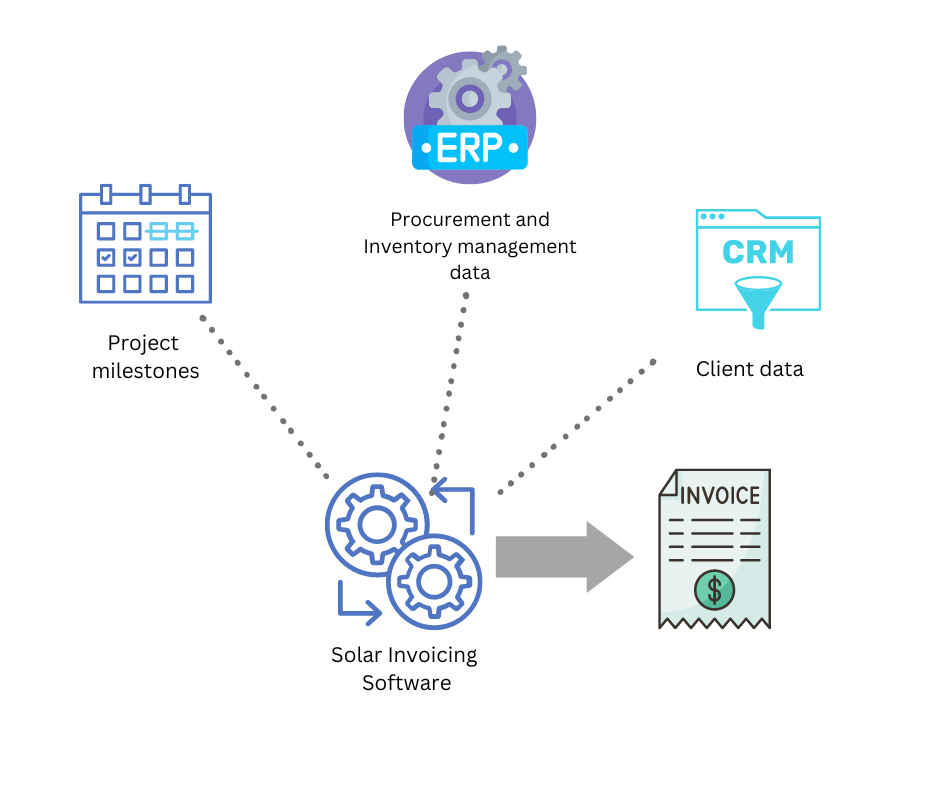The solar energy industry is rapidly growing, and with it comes the need for efficient and accurate invoicing systems. Solar Engineering, Procurement, and Construction (EPC) companies face unique challenges when it comes to generating invoices for their diverse projects.
In this blog post, we will explore the common invoicing challenges faced by solar industries and how specialized solar invoicing software can be the perfect solution.
Common Invoicing Challenges Faced by Solar Industries
1. Complex pricing structures:
In the solar industry, pricing solar projects can be complicated because they involve many different components like solar panels, inverters, batteries, and installation services. Each component comes in different types and brands, making it hard to calculate the total cost accurately.
For example, solar panels have different sizes and efficiencies, and each one may have a different price. The same goes for inverters and batteries, which can vary in capacity and features. On top of that, the cost of installation services depends on the project’s size, complexity, and location.
Considering all these variations, calculating the overall cost of a solar project can be challenging and time-consuming. There’s also a risk of making mistakes when doing the calculations manually.
Solution:
- Software that automates calculations based on the selected components, their respective prices, and any customization required for each project.
- Standardization: The software allows you to standardize the billing process by using standard prices for common materials like panels, inverters, and distribution boxes. Thus, ensuring consistent and accurate cost estimates for different projects.
2. Tailoring Invoices to company-wise practices
Different companies have different invoicing practices. Each company may have its own specific invoicing requirements and preferences.
For example, some companies may prefer detailed itemized invoices, while others may prefer a more simplified format. Additionally, the frequency of invoicing, payment terms, and accepted payment methods may vary from one company to another.
As a result, creating invoices that cater to the individual preferences and practices of each company can be time-consuming and may require custom adjustments for each client. This can lead to inefficiencies in the invoicing process, potential errors, and delays in sending out invoices.
Solution:
Software that offers customizability to create personalized invoices that align with your unique invoicing requirements and preferences.
3. Project timeline and milestones: managing invoicing in phases of solar installations
Solar projects progress through multiple stages, from planning to installation. These stages mark significant milestones in the project’s development and achievements.
For successful project management, invoicing at specific milestones is crucial. At each stage of the solar project, the company can generate invoices to request payments for the work completed during that phase.
For instance, after finishing the initial planning and design stage, the company can issue an invoice for those specific services. Timely invoicing ensures a steady cash flow, allowing the solar company to cover expenses, such as purchasing materials and paying for labor, while also effectively managing the project’s progress.
However, managing invoicing effectively throughout the multiple stages of solar installations.
Solution:
Software that generates invoicing schedules based on project milestones. It ensures that invoices are issued at the appropriate stages, aligning with project progress and facilitating timely payments.
4. Invoicing discrepancies: Integration with procurement and inventory management
Tracking solar materials, managing inventory, and billing for the right components can be complex and prone to errors.
For example, a solar company handles multiple solar installations simultaneously. They need to accurately track the inventory of solar panels, inverters, and batteries to ensure they have sufficient stock for each project.
Moreover, billing the customers for the specific components used in each project requires meticulous record-keeping and precise calculations.
Thus, seamless integration with procurement and inventory management is required. Or else, it can lead to invoicing discrepancies, affecting the company’s financial accuracy.
Solution:
Software that integrates with inventory management systems, streamlining billing for solar materials. It ensures precise tracking and efficient management of the supply chain, reducing invoicing discrepancies.
How can Solar Invoicing Software help you?

- Customizable Invoicing Templates: Solar invoicing software provides ready-to-use templates that can be easily customized to suit the specific needs of different solar projects. This flexibility enables businesses to create tailored invoices for each client, ensuring professionalism and personalization in the invoicing process.
- Automated Pricing Calculations: The software automates price calculations based on standard pricing for various materials and services used in solar projects. This ensures consistent and accurate cost estimates, saving time and reducing the chances of errors in invoicing.
- Project Milestone Tracking: The software tracks the progress of solar projects and generates invoices at key milestones. This streamlines the invoicing process, ensuring timely billing and payment collection, aligned with the completion of significant project phases.
- Integration with Solar CRM and Project Management Software: Solar invoicing software seamlessly integrates with other solar management tools like CRM and project management software. This creates a cohesive system that streamlines business operations, improving efficiency and collaboration among different departments.
- Timely Reminders: The software sends automated payment reminders to customers, ensuring that payments are made on time. This reduces the number of late payments, enhancing cash flow management for the solar company.
- Centralized Data Management: All invoicing data, project details, and financial information are stored in one central database. This provides easy access and real-time visibility into the company’s financial status, making it convenient for decision-making and financial analysis.
- Reporting and Analytics: The software generates comprehensive financial reports, offering valuable insights into revenue, payments, and outstanding invoices. These reports aid businesses in making better-informed decisions and improving financial planning.
- Data Security: Solar invoicing software prioritizes data security by implementing robust measures to protect sensitive financial and client information from unauthorized access or breaches, ensuring the company’s data is safe and confidential.
Conclusion:
Overcoming the invoicing challenges faced by the solar industry is essential for the success and growth of solar EPC businesses.
By using specialized solar invoicing software, companies can streamline the pricing process, tailor invoices to unique project requirements, manage project milestones effectively, and integrate with procurement and inventory management.
A robust invoicing solution empowers solar companies to provide accurate, timely, and highly customized invoices, fostering better customer relations and improving overall efficiency in the solar industry.
